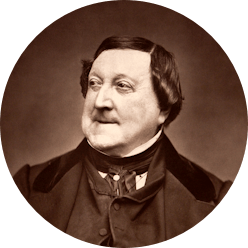
Gioachino Rossini
February 29, 1792 - Pesaro, Italy — November 13, 1868 - Passy, France
© Étienne Carjat (1865)
About
Gioachino Rossini, the king of opera
A son of musicians, he studied singing and harmony in Bologna under the strict rule of the abbot Mattei. Passionate about the theatre, Gioachino Rossini at the early age of eighteen managed to have his first comic opera, The Marriage Contract performed in Venice. In 1813, the first production of Tancredi opened the path to success and made him the undisputed master of the Italian lyrical stage until Gaetano Donizetti’s appearance in the 1820s. Rossini worked hard and his compositions followed in extraordinarily rapid succession. The Barber of Seville, Othello and The Lady of the Lake bear witness to this joyous compulsion of vivacious musical writing full of quivering virtuosity. From 1824 onwards, Rossini settled in Paris and wrote his last opera, William Tell, (1829). He then gave up composing for the last thirty-six years of his life.
Joy and pleasure in Rossini's work
His legendary good humour, the sumptuous diners he prepared at his home and his thundering laugh made Gioachino Rossini into an endearing, colourful and joyful comic composer acclaimed throughout Europe. His operas were indeed renowned for their humour, truculence, titillating style and lovers’ intrigues but Rossini did not only compose runs and high-pitched or repeated notes; his works also include a Stabat Mater and a moving Petite messe solennelle written when Meyerbeer stole the show of the Parisian operas.
The secret of his success? Gioachino Rossini only wrote according to his instinct and pleasure in a century keen on schools and doctrines. He boldly threw out all the rules of the time to forge forms heralding the Romantic revolution and Italian opera. He was a man of joyful modernity.

